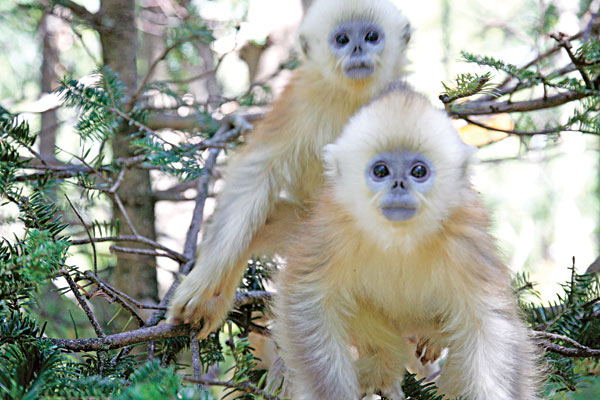The golden creatures of Shennongjia
Updated: 2016-06-11 02:32
By Liu Kun,Liu Xiangrui(China Daily)
|
|||||||||
 |
|
Shennongjia Nature Reserve has been one of the most important habitats for golden snub-nosed monkeys, a rare primate living exclusively in China. PHOTOS PROVIDED TO CHINA DAILY |
In 2005, researchers began to provide food to the monkeys, starting with usnea, a kind of parasitic plant growing on pine trees. However, it was too difficult to collect enough of this in winter, and so they started to feed the monkeys apples wrapped in usnea instead.
The monkeys were very cautious at first and they took three months to try the apples and adapt to the new diet, Huang says.
"It was a breakthrough. It allowed us to closely observe the monkeys and laid the foundation for further research on them."
Nowadays, the researchers get up at daybreak to track the monkeys, and feed them three or four meals a day, with usnea, apples, pine cones and other foods.
Over the years, the number of the snub-nosed monkey population in the reserve has risen from about 500 in the mid-80s to more than 1,300 now.
Yang Jingyuan, head of the reserve's scientific research institute, says the achievement is the result of several major national campaigns such as the country's natural forest protection project started at the beginning of the century.
"These projects have reduced human activity and damage to their habitats, and gradually increased their range of activity. The maturing protection network and supply of food in winter has also played a crucial role."
In 2011, the State Forestry Administration of China turned the Dalongtan base into a national research center for golden snub-nosed monkeys. Its activities include artificial breeding, disease research, habitat protection and supplying food in winter.
It collaborates in research with many universities and often receives international scientific research groups.
With greater support from the national government in recent years, the center has carried out more key protection projects related to the species, such as restoring fragmented or degraded habitats and finding potential new habitats in the region.
At its Dalongtan base, the center has set up a 4G monitoring platform that includes technologies such as wireless sensoring, satellite navigation and positioning and cloud services.
"The projects not only benefit the habitat protection and management of the snub-nosed monkeys but may provide an example for protecting other endangered animals," Yang says.
Contact the writer through liuxiangrui@chinadaily.com.cn
Related Stories
China to artificially breed rare golden monkeys 2012-08-31 06:45
China sets up research center to protect rare golden monkeys 2012-03-05 14:31
Chengdu golden monkeys settle in HK 2012-02-06 10:13
Golden monkeys in forest get help from government 2010-10-28 17:37
Today's Top News
The can-do generation to the fore
Riding the wave
China lists first sovereign offshore RMB bond on LSE
British PM denounces Brexit's 'complete untruths'
47% of European businesses would expand in China
Xi urges Washington to boost trust
Council of Europe unveils security convention
Former PM warns of chaos in case of Brexit
Hot Topics
Lunar probe , China growth forecasts, Emission rules get tougher, China seen through 'colored lens', International board,
Editor's Picks

|

|

|

|

|

|







